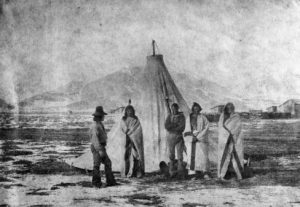Pioneer, the Verb
Let's make every day a pioneer day by using "pioneer" as a verb.

Despite the growing threat of civil war in the United States, in November 1858, the largest concentration of U.S. troops in the entire country was in the Utah Territory of all places. Reacting to rumors, U.S. President James Buchanan ordered 2,500 soldiers to Utah to crush a rebellion that never existed. (More on that later).
That said, the presence of U.S. troops in the Utah Territory provoked conflict.
Having literally been "exterminated" from the state of Missouri by order of Governor Lilburn Bogs, many "Mormon" pioneers in Utah were understandably angred by this military action ordered by the President of the United States. Pioneer guerrillas known as the "Nauvoo Legion" harrassed troops for months. Their mission: "to annoy them in every possible way."
Once an agreement was reached, boy did things change.
The soldiers built Camp Floyd — with the help of cooperative and friendly Utah pioneer laborers and artisans.
And during the soldiers' three year occupation of Utah, the soldiers and Utah pioneers organized theatrical productions, a circus, a temperance society, engineered a unique watering system, planted gardens, etc. They even built the first Masonic lodge in Utah.
According to Utah.gov:
The most significant contribution of the army came in its assistance in improving western immigrant roads. Under the direction of Captain James H. Simpson of the Army Corps of Engineers, new routes were mapped which shortened travel time between the states and California; already existing trails were also improved. Scientists and artists accompanying the troops studied the scenery, flora and fauna, collecting specimens and sketching their findings to add to the knowledge of this newly opening area.
The improved transportation infrastructure became part of the famous Pony Express" route.
It sounds like the "Utah War" was pretty grim, doesn't it? I don't think the United States has ever been in a three-year war like it.
Senator Sam Houston of Texas had this to say about the Utah War:
"I deprecate it as an intolerable evil. I am satisfied that the Executive [President Buchanan] has not had the information he ought to have had on this subject before making such a movement as he has directed to be made."
Eventually, on April 6, 1858, President James Buchanan issued a proclaimation filled with face-saving inaccuracies, but ultimately it pardoned the Latter-day Saints.
On June 19, 1858, the New York Herald wrote:
"Thus was ended the 'Mormon war', which ... may be thus historisized: – Killed, none; wounded, none; fooled, everybody."
The Herald was wrong about there being no casualties in the conflict, but their point about how disinformation fooled everyone still stands.
The national press went on to refer to the whole thing as "Buchanan's Blunder".
By midsummer of 1861, the fort was abandoned, "However, many Utah families trace their roots to soldiers who chose to remain in Utah after leaving the army" (utah.gov).
Thanks to the admirable character of all involved, instead of war, evil disinformation resulted in peace, and in happiness among diverse peoples.
Thanks to the admirable character of all involved, instead of a bloody, devistating war, evil disinformation ultimately resulted in peace, and in happiness among diverse peoples.
Today people would call the rumor that nearly instigated a tragic and unnecessary war: "fake news".

In the United States, "fake news" has become a primary weapon in an ongoing culture war between political groups.
And it is incredibly easy to get sucked into that war.
Today, July 24, 2022, is Pioneer Day in Utah.
• As a noun, "pioneer" means "a person who is among the first to explore or settle a new country or area" (Oxford Languages English Dictionary).
• As a verb, "pioneer" means "develop or be the first to use or apply a new method, area of knowledge, or activity" (Oxford Languages English Dictionary).
Let's make every day a pioneer day by using the word "pioneer" as a verb.
It was the admirable character of the two sides of the so-called Utah War that ultimately resulted in favorable circumstances for all involved.
Let us together pioneer new methods of peacefully interacting with diverse groups and perspectives, thus deescalating the culture war raging in our time.
Thanks for listening.
Links:



.svg/23px-Flag_of_the_United_States_(1851%E2%80%931858).svg.png)










